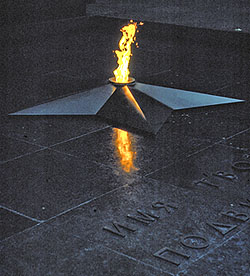HIS 112
Unit 10: World War II

|
Eternal flame.
This is part of the formal unknown soldier tomb in front of the Kremlin
Walls, Moscow. There is also a war memorial in the Aleksandrovskii
Garden on the east side of the Kremlin. In reality, there are
literally thousands of
unknown soldier tombs or monuments on sites of mass burials of Russian
dead from World War II. It is still not clear how many Russians
died in the war--20, 30, 40 or perhaps even as many as 50 million.
|
 What you
must do in this unit
What you can do in this
unit
Some videos that you can watch for this unit
What you
must do in this unit
What you can do in this
unit
Some videos that you can watch for this unit
- See the videos dealing with World War II in the HIS 102 course.
- For extra credit please suggest to your instructor a relevant video for this unit of the course. Send the title of the video, the url and a brief explanation of why you find the video interesting and applicable to the material that is being studied in this unit.
Extra Credit Options
- Take the short 5-point quizzes for chapters 32 and 33. Log into Blackboard and look under "Chapter Quizzes." You have five minutes to complete each quiz (multiple-choice questions).
- For a maximum of 50 points extra credit, read Neville Chamberlain's Peace For Our Time speech
(30 September, 1938; transcription) and then his comments on the agreement in the House of Commons and write a one-page paper examining Chamberlain's intent and rationale for the Munich agreements.
- For a maximum of 50 points extra credit, read the Documents on the
Decision to Drop the Bomb and write a one-page paper summarizing some of the pros and cons of the decision to use the atomic bomb in 1945.
- For a maximum of 50 points extra credit, in a one-page paper What types of evidence did the allied prosecutors
bring against the Nazi leaders in the proceedings at Nuremberg?
- For
a maximum of 25 points extra credit (maybe more), in a long paragraph, What should
people do now in respect to the atrocities that occurred before and
during World War II?
- For 25 points maximum extra credit, read
A. Anatolii [Kuznetsov], Babi Yar (1967, published in Moscow by Molodaia
Gvardiia) and write a long paragraph explaining why that horror occurred.
- For 25 points maximum extra credit, read the materials on
Nazi-Soviet Relations 1939-1941 and write a short paragraph explaining why Germany and Russia maintained their alliance for two years.
- For a maximum of 25 points extra credit, read Vyacheslav Molotov (1889-1986) broadcast on the Invasion of The Soviet Union
(June 22, 1941) and write a paragraph explaining the key points
of Molotov's speech. Note that it was Molotov, not Stalin, who
announced that the Soviet Union was now at war with Germany.
- For a maximum of 25 points extra credit, read Adolf Hitler Reichstag
Speech, (February 20, 1938) and in a paragraph explain your interpretation of Hitler's remarks.
- For a maximum of 25 points extra credit, read Chamberlain's speech on the Nazi Invasion of Poland (1
September 1939; transcription) and in a paragraph examine what
Chamberlain must have been thinking as he faced his colleagues in the
House of Commons.
- Watch Leni Riefenstahl's documentary film Triumph des Willens (Triumph of the Will) and
answer the movie
study questions for a maximum of 10 points extra credit. Please write in formal, complete sentences.
- For 10 points maximum extra credit, answer the Genocide paragraph study sheet questions.
- For extra credit, please suggest a
relevant website for this unit of the course. Send the title of the site, the url and a
brief explanation why you find the information interesting and applicable to
the material being studied this unit.
|

